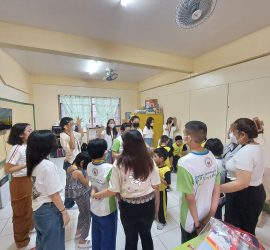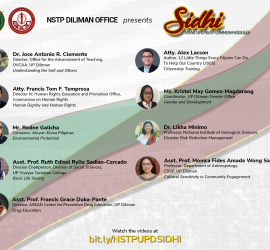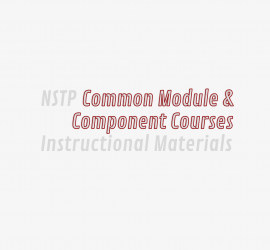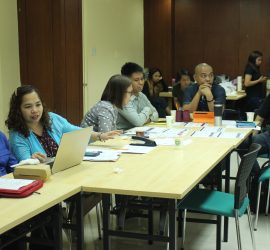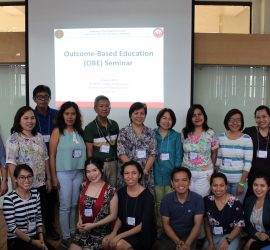UP Diliman through the NSTP-NSRC Office proudly participated in the Tokushima Online Exchange Program 2024–2025, a regional initiative by the Tokushima Prefectural Government in Japan that promotes SDG 12: Sustainable Consumption and Production, focusing on ethical food consumption and youth-led consumer behavior. This year, our NSRC Reservists explored ethical consumption through the lens of local food heritage. Their handbook, “From Root to Table: Embracing Philippine Food Heritage for Ethical Consumption,” advocates for the use of native and endemic plants in Filipino cuisine—highlighting sustainability, ecological significance, and cultural preservation. Guided by Dr. Benito Pacheco, Prof. Emeritus Lourdes J. Cruz, Ms. Judith Camille Rosette, Asst. Prof. Olivia Alma Sicam, and Dr. Nappy Navarra, the student representatives and NSTP graduates—Mark Aspiras, Adrienne Riel C. Cruz, Jester Vince P. De Torres, Danella Benice V. Vasquez, and Joseph F. Zabala—actively contributed to this international dialogue, culminating in their participation at the Tokushima International Consumer’s Forum held on June 6, 2025 where Mark Aspiras and Dr. Navarra represented UP Diliman in Japan, exchanging insights with fellow participants from across Asia. This program builds on the successful 2022–2023 collaboration, where UP produced “Sustainable Consumption 101: Your Ultimate Guide to Sustainable Living.” With NSTP Diliman leading the initiative, this engagement continues to empower students to be advocates of sustainable lifestyles and ethical consumption. You can view the team’s full handbook here.
NSTP
The UP Psychology Society (UP PsychSoc) has long been a beacon of hope and support for children with special educational needs. Their project, InDAK, has become a flagship initiative, emphasizing the importance of accessible and relevant special education and mental health wellness services. With their partnership dating back to 2008, UP PsychSoc has been actively involved with Batino Elementary School, a center dedicated to children with special educational needs. This article delves into the motivations, challenges, and successes of the InDAK project, based on an interview with Joaquin Guevara, a dedicated member of UP PsychSoc. The Genesis of InDAK UP PsychSoc’s partnership with Batino Elementary School began in 2008, with a shared goal of advancing psychology through self-expression and vocation. Initially, the organization focused on sensory activities such as texture and scent-based sessions to assist students with visual impairments and learning disabilities. Over time, the objectives evolved to include supplementary activities that complement classroom learnings, helping children to socialize and energize themselves such as arts, puppeteering, painting, singing, and theater, alongside sports and dancing to hone fine motor skills and spatial awareness. Overcoming Challenges Transitioning to a predominantly face-to-face setup in the academic year 2023-2024 posed several challenges. The InDAK team dedicated the initial months to establishing logistical systems and partnership communications. With the groundwork laid by the previous year’s committee and the support from the UP NSTP-NSRC Office, the organization navigated budget constraints and logistical hurdles successfully. Despite scheduling conflicts due to academic calendar mismatches, transport strikes, and national holidays, the team focused on enhancing session quality through internal production works, increasing volunteer turnout, and setting engaging activities. Participation and Engagement The active participation of students and their families has been a cornerstone of InDAK’s success. Students eagerly engaged in activities, particularly those related to art and dancing. Guardians played a crucial role in behavioral management and interaction, working closely with volunteers to ensure children’s engagement. This collaboration fostered bonding between parents and children, enhancing the overall impact of the sessions. Practical and Recreational Activities In the current academic year, InDAK activities included beaded bracelet making and mural creation. […]
Last July, the NSTP Diliman Office launched the “SIDHI: Tatak UPD NSTP Common Modules” knowledge products with nine (9) free instructional materials for NSTP implementers and students of the University of the Philippines Diliman, and the wider public. This lecture videos aim to complement the first batch of NSTP instructional materials on common and component module topics launched in October 2020. Coming from the root word, “sidhi,” meaning “to intensify,” these knowledge products delve deeper and introduce new concepts on the common modules. Based on the recalibrated outcomes-based education-framed Tatak UPD NSTP 1 course, this series features experienced resource speakers from within and outside the University. This project also aims to support the NSTP implementers and students during this shift to remote and blended learning modes by providing accessible and free NSTP resource materials. Here’s the overview of the areas covered by SIDHI videos: Understanding the Self and Others – Dr. Jose Antonio R. Clemente Under this topic, Dr. Clemente discusses the concept of Sikolohiyang Pilipino and how it relates to one’s role and responsibilities in the community. His lecture video also encourages the NSTP students to reflect and understand the nuances of their relationship with the community as an individual and as part of it, when implementing NSTP projects. Citizenship Training – Atty. Alexander “Kuya Alex” L. Lacson Atty. Lacson, author of bestselling patriotic books, a poet, a lawyer, and a civil society leader, gives some tips and discusses how doing simple things can help us promote citizenry, as people of our country, and as NSTP students. Human Dignity and Human Rights – Atty. Francis Tom F. Temprosa Dir. Temprosa of Commission on Human Rights (CHR), discusses the Human Rights Approach and how it can be best applied when engaging with the community, especially during NSTP project implementation. Gender and Development – Ms. Kristel May Gomez-Magdaraog Building on the introduction and orientation of SOGIESC, laws and mandates on gender development, Ms. Gomez-Magdaraog now focuses her discussion on how to best integrate and practice Engendering NSTP implementation, especially during community engagements. Environmental Protection – Mr. Rodne R. Galicha Mr. […]
On October 15, 2020, the NSTP Diliman Office disseminated 11 free online NSTP instructional materials on common and component module topics for UP Diliman program implementers and the wider public. In partnership with TVUP, the television arm of the University, the project aims to strengthen NSTP remote learning course offerings, aid NSTP students and instructors during this semester’s remote learning mode, provide easily accessible NSTP materials for instructors and students, and provide additional knowledge products to the Tatak UP Diliman NSTP module. This set of instructional materials is based on a recalibrated outcomes-based education-framed NSTP 1 course. These knowledge products, characterized through a series of video-recorded discussions by content experts, are nods to NSTP Diliman common modules. The topics of the modules are a result of a series of writeshops that standardized the learning objectives and topics of UP Diliman NSTP content. The NSTP modules were approved by the NSTP Diliman Council through the guidance of Dr. Rosella Torrecampo, the Writeshops Resource Person. In September, TVUP, headed by Professor Emeritus Grace J. Alfonso, started the recording sessions with our pool of speakers from various colleges and departments of the University. “These materials would greatly help the community of NSTP implementers in teaching their students,” said Director Jonalou S. Labor, PhD. He added that the Office pushed through with these content in order to provide support both for teachers and students not only in UP Diliman but to other higher education institutions in the country. Here are the materials: Tatak UPD NSTP Orientation – Asst. Prof. Arlyn P. Macapinlac NSTP Tatak UPD Orientation covers topics on the role of UP as a public service university, the rationale and Implementing Rules and Regulations (IRR) of NSTP, the Tatak UPD NSTP Framework, and the reservist program. Understanding the Self and Others – Ms. Athena Charanne R. Presto Understanding the Self and Others discusses different perspectives on the concept of self and relates these to one’s role and responsibilities in society. The module also prompts students to explore possible community engagement involvement. Human Dignity and Human Rights – Ms. Marielle Antoinette H. Zosa Human […]
Taking off from last year’s Program Mapping series, the National Service Training Program (NSTP) Diliman with NSTP Coordinators and Instructors held its first Program Mapping Workshop for the year last February 11, 2019 at the National Engineering Center, UP Diliman. The two group outputs from the last workshop on November 19, 2018 were combined into one NSTP Program Map by NSTP Diliman. This was presented to the assembly at the beginning of the activity by NSTP Director Arlyn P. Macapinlac. With the purpose to review and refine the NSTP Program Map, Prof. Macapinlac led the commencement of the activity. This was followed by the group workshop aimed to polish the program map. During the beginning of the workshop, it was determined that it would be easier to accomplish this goal if done by the whole congregation. The participants then proceeded to break out from their groups to listen to just one facilitator. With the facilitation of Prof. Julienne Baldo-Cubelo, the NSTP Program Map was reviewed item by item, taking note of the words and concepts encapsulated in each row and column. Participation from the audience was lively. Prof. Rosella M. Torrecampo, Director of the Office for the Advancement of Teaching, was also invited to impart her expertise on the OBEdization of the NSTP Program Map. Suggestions and corrections were raised by Prof. Torrecampo on the spot. At the end of the day, the NSTP Program Map was crafted and finished. NSTP Diliman will now be able to continue mapping the NSTP Common Module and NSTP Components: Civic Welfare Training Service (CWTS), Literacy Training Service (LTS), and Reserve Officers’ Training Corps (ROTC). These efforts are part of curriculum development of the National Service Training Program in UP Diliman. Coming up next is the NSTP Component Mapping Workshop in March. by Klaribelle Anne B. Languayan
A whole day Outcome-Based Education (OBE) Seminar Workshop was held last 31 August 2018 at the G.E. Theater, College of Engineering, UP Diliman for NSTP instructors from different colleges. NSTP Diliman Director Prof. Arlyn Macapinlac, during her welcome remarks, emphasized the need to continuously improve the existing NSTP Common Module. As the university calls to conform with Outcome-Based Education principles, the NSTP Diliman Office deemed it fit to follow suit. It is directed towards producing an “OBEdized” syllabus. Dr. Amelia Fajardo of the Curriculum Studies Department of the College of Education, UP Diliman, served as the resource person for the seminar-workshop. The following were discussed during the seminar: Differentiation of curriculum from instruction The relationship of curriculum to instruction Three domains of curriculum Bases for the determination of the elements of the curriculum Important features of OBE How to formulate OBE learning objectives Curriculum and instruction were differentiated from each other using the rosary and the puzzle ideology; the rosary as a prescriptive model of curriculum following a specific order of instruction, while the puzzle as a student-based curriculum which reflects that instruction depends upon the player. It was noted that there is no instruction if there is no curriculum, hence, a crafted curriculum is important in order to proceed with standardized instruction. It was also clarified that instruction is not a way of teaching, but a plan which answers to the elements’ learning intent, learning content, teaching strategy, and assessment. From this, Dr. Fajardo shared that curriculum development is defined as a decision-making process on these four elements of the curriculum. Further, factors that influence the curriculum are philosophy of education, socio-cultural context, theories of learning, and the demands of the industry or profession. The afternoon session was continued at the Maynilad Room of the College of Engineering, UP Diliman. Before the workshop proper, Dr. Fajardo lectured on the formulation of OBE objectives and program. The first task of the workshop is to envision the ideal characteristics of the NSTP graduates based on the NSTP program vision, mission, and goals (VMG). Program outcomes, which correspond to the measurable […]


